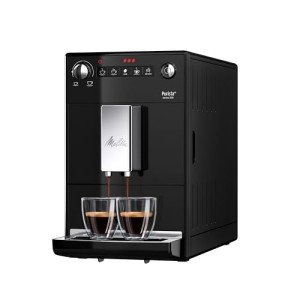10 Of The Top Facebook Pages Of All Time About Home Use Espresso Machines
Home Use Espresso Machines: A Comprehensive Guide
Espresso machines have become a staple in numerous families as coffee lovers seek to duplicate café-quality brews in the comfort of their cooking areas. The rise in popularity has caused a varied market filled with numerous designs, functions, and costs. This post aims to provide an informative introduction of home use espresso machines, assisting readers navigate their alternatives efficiently.
Comprehending Espresso Machines
Espresso machines work by requiring hot water through finely-ground coffee under high pressure, leading to a focused coffee drink called espresso. There are a number of kinds of espresso machines classified based on their developing approaches and level of automation. The most common types include:
Manual Espresso Machines: These need the user to control the pressure and water flow, permitting for a more hands-on coffee-making experience.
Semi-Automatic Espresso Machines: These use automatic control over water pressure, while the user manually grinds and tamps the coffee.
Automatic Espresso Machines: With the push of a button, these machines immediately control the flow of water, making it easier to brew espresso with constant results.
Super-Automatic Espresso Machines: These all-in-one machines handle grinding, tampering, brewing, and even milk frothing, making them perfect for users looking for convenience.
Pill or Pod Machines: These use pre-packaged coffee pods to produce espresso with very little effort, but they limit option in developing strategies and flavors.
Table: Comparison of Espresso Machine Types
Type
Control Level
Ease of Use
Cleaning up Level
Ideal For
Manual
User-controlled
Moderate
High
Coffee perfectionists
Semi-Automatic
Partial automation
Moderate
Moderate
Home baristas
Automatic
Totally automated
Easy
Low
Hectic individuals
Super-Automatic
Completely automated
Very easy
Really low
Convenience candidates
Capsule/Pod
Completely automated
Extremely simple
Very low
Casual drinkers
Secret Features to Consider
When selecting a home use espresso machine, it's important to consider numerous features that can considerably impact the quality of espresso and user experience.
Pressure: Look for machines that supply a minimum of 9 bars of pressure, as this is thought about ideal for developing espresso.
Boiler Systems: Single vs. dual boiler systems identify temperature stability and the ability to brew espresso and steam milk at the same time.
Grinder: Integrated grinders permit newly ground coffee, which improves flavor. Consider machines with adjustable grind settings.
Milk Frother: For those who enjoy cappuccinos and lattes, a built-in steam wand or automatic frother is crucial.
Size and Design: Consider your kitchen space and visual preferences. Retro Espresso Machines come in numerous sizes, from compact to big setups.
Price: Home espresso machines can vary from a couple of hundred to numerous thousand dollars, so it's essential to develop a budget before exploring alternatives.
Advantages and disadvantages of Home Use Espresso Machines
Pros
Cons
Convenience of brewing coffee in your home
Initial investment can be high
Quality of espresso is typically remarkable
Requires some skill, particularly with manual machines
Capability to experiment with flavors
Maintenance and cleaning can be labor-intensive
Can save money in the long run
Not all machines will suit every coffee preference
Upkeep and Cleaning Tips
Preserving an espresso machine is essential for extending its life and making sure constant brew quality. Here are some useful tips:
Regular Descaling: Minerals from water can develop up in the machine. Descale every 1-3 months, depending upon water hardness.
Daily Cleaning: Rinse portafilters, baskets, and steam wands after each use to avoid coffee oils from building residue.
Use Filtered Water: This can help decrease mineral accumulation and improve the taste of coffee.
Change Gaskets and Seals: These parts may use out in time and must be changed to preserve pressure and performance.
Check out the Manual: Each machine has specific care guidelines; following these will ensure longevity.
FAQs About Home Use Espresso Machines
**Q1: What is the very best budget espresso machine?The best budget espresso machine frequently depends on private needs, however designs like the DeLonghi EC155 or the Breville Bambino are popular amongst users for supplying excellent value. Q2: How long do home espresso machines normally last?With appropriate upkeep, home espresso machines can last anywhere from 5 to 15 years, depending on the quality of the machine and frequency of use. Q3: Can I make cappuccinos and lattes with any espresso machine?While most espresso machines can make coffees and lattes, having a trustworthy
steam wand or frother is vital for accomplishing the right milk texture.
Q4: Are super-automatic machines worth the investment?For those who prioritize benefit and quick brewing, super-automatic machines can be worth the investment, though they may do not have some customizability in brew strength and flavor. Q5: What kinds of coffee beans are best for espresso?While individual choice contributes, beans labeled as” espresso “blends are usually roasted darker, developing rich flavors and a velvety texture when brewed.
Investing in a home espresso machine can change the everyday coffee routine into something unique, elevating home brews to café quality. By comprehending the different kinds of machines, essential features to think about, upkeep requirements, and weighing the
pros and cons, consumers can make educated choices that match their private choices. As the espresso culture continues to grow, no matter the choice, every brew can be a scrumptious experience waiting to be enjoyed.  **
**